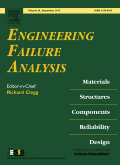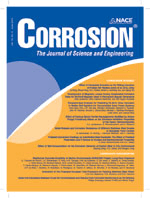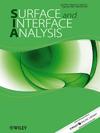
CORROSION ENGINEERING SCIENCE AND TECHNOLOGY
Scope & Guideline
Empowering research to mitigate corrosion impacts.
Introduction
Aims and Scopes
- Corrosion Mechanisms and Processes:
Investigation into the fundamental mechanisms of corrosion, including electrochemical processes, localized corrosion phenomena, and the effects of environmental factors on corrosion rates. - Corrosion Protection Techniques:
Exploration of various methodologies for corrosion prevention, such as coatings, inhibitors, and novel material formulations aimed at enhancing corrosion resistance. - Material Performance in Corrosive Environments:
Evaluation of different materials and alloys under various corrosive conditions, including their susceptibility to stress corrosion cracking, pitting, and other forms of degradation. - Innovative Experimental Techniques:
Application of advanced experimental methodologies such as electrochemical impedance spectroscopy, atomic force microscopy, and computational modeling to study corrosion behavior and predict performance. - Environmental and Ecological Considerations:
Research addressing the environmental impact of corrosion and the development of eco-friendly corrosion inhibitors and protective measures. - Multidisciplinary Approaches:
Integration of insights from materials science, chemistry, engineering, and environmental science to address corrosion issues in a holistic manner.
Trending and Emerging
- Nanotechnology in Corrosion Protection:
The use of nanomaterials and nanocoatings for enhancing corrosion resistance is gaining prominence, reflecting a broader trend towards advanced materials engineering. - Biogenic and Eco-Friendly Corrosion Inhibitors:
Research into natural and sustainable corrosion inhibitors, such as plant extracts and biopolymers, is increasing, aligning with global sustainability goals. - Advanced Corrosion Monitoring Techniques:
Development and implementation of sophisticated monitoring technologies, including real-time sensors and non-destructive testing methods, are trending to improve corrosion detection and management. - High-Entropy Alloys and New Materials:
The exploration of high-entropy alloys and other novel materials for corrosion resistance showcases a shift towards innovative material solutions in demanding environments. - Impact of Climate Change on Corrosion:
Research addressing the influence of climate change on corrosion processes, particularly in marine and industrial environments, is emerging as a significant theme. - Artificial Intelligence and Machine Learning Applications:
The application of AI and machine learning to predict corrosion behaviors and optimize corrosion protection strategies is becoming a key area of interest.
Declining or Waning
- Traditional Coating Systems:
Research on conventional coating systems may be waning as newer materials and technologies, such as nanocoatings and environmentally friendly solutions, gain traction. - Corrosion in Non-Industrial Settings:
Studies focusing on corrosion in non-industrial settings, such as rural or less polluted environments, appear to be decreasing as the focus shifts to high-impact industrial applications. - Basic Corrosion Theory:
While foundational studies are essential, the exploration of basic corrosion theories may be declining in favor of applied research that addresses specific, real-world corrosion challenges. - Corrosion in Historical Contexts:
Research on corrosion phenomena related to historical artifacts and conservation might be seeing reduced attention compared to contemporary industrial applications. - Conventional Materials Testing:
Standardized testing methods for traditional materials may be less emphasized as innovative materials and hybrid systems become the focus of research.
Similar Journals

Corrosion Science and Technology-Korea
Empowering researchers to enhance materials longevity.Corrosion Science and Technology-Korea, published by the CORROSION SCIENCE SOC KOREA, is a pivotal journal dedicated to the exploration and advancement of knowledge in corrosion science, particularly within the context of materials performance and maintenance. Established to foster innovation and collaboration among scholars in South Korea and beyond, this journal focuses on areas such as electrochemistry, metal alloys, and surface coatings, catering to a diverse audience of researchers, professionals, and students in materials science and chemistry. Despite its current quartile rankings, including Q4 in Electrochemistry and Q3 in various materials-related categories, the journal aims to enhance its visibility and impact in the scientific community by publishing high-quality research and reviews. With its ISSN 1598-6462 and E-ISSN 2288-6524, Corrosion Science and Technology-Korea is committed to contributing to the understanding and mitigation of corrosion issues, thereby promoting sustainability and longevity in engineering applications.

Moroccan Journal of Chemistry
Empowering Chemists with Cutting-Edge Discoveries.Moroccan Journal of Chemistry, published by the University Mohammed Premier Oujda, serves as a pivotal platform for researchers and professionals in the field of chemistry, particularly focusing on diverse and emerging areas within the discipline. Established in 2018, this open-access journal facilitates widespread dissemination of scholarly articles, ensuring that cutting-edge research reaches a global audience. With an ISSN of 2351-812X and categorized in the Q3 quartile for miscellaneous chemistry in 2023, the journal maintains rigorous peer-review standards while fostering an inclusive environment for scientific dialogue. Located in Morocco, it aims to bridge local and international research communities, contributing to the advancement of knowledge in chemistry. As it continues to grow, the Moroccan Journal of Chemistry remains an essential resource for students, educators, and professionals eager to stay abreast of the latest developments in the field.

Engineering Failure Analysis
Elevating Engineering Standards Through AnalysisEngineering Failure Analysis is a prestigious peer-reviewed journal published by PERGAMON-ELSEVIER SCIENCE LTD, dedicated to advancing the field of engineering through comprehensive investigations into the causes and consequences of failures in various engineering domains. Established in 1994, the journal has become a cornerstone of knowledge in sectors such as Aerospace, Automotive, and Materials Science, earning its place within the Q1 quartile across multiple relevant categories in 2023. With a broad scope that encompasses topics related to safety, risk, reliability, and quality, it serves as a vital resource for researchers, professionals, and students keen on understanding how to mitigate failures and improve engineering practices. Although this journal does not currently offer Open Access, its impact is underscored by its high Scopus ranking, where it sits comfortably in the 36th position out of 307 in General Engineering. By bridging theoretical insights and practical applications, Engineering Failure Analysis plays a pivotal role in shaping the future of engineering standards and safety practices.

Ochrona Przed Korozja
Innovating Solutions for Corrosion ChallengesOchrona Przed Korozja is a pivotal journal dedicated to advancing the understanding and application of corrosion protection, a critical area within the realms of Chemical Engineering, Materials Chemistry, and Metals and Alloys. Published by WYDAWNICTWO SIGMA-NOT SP ZOO in Poland, this journal seeks to provide a comprehensive platform for researchers and professionals to share innovative findings, methodologies, and technologies related to corrosion prevention and management. With an ISSN of 0473-7733 and E-ISSN 2449-9501, the journal features articles that contribute to the scientific community, despite its current Q4 ranking across several relevant categories as of 2023. As it converges through the years 2019 to 2024, Ochrona Przed Korozja plays an essential role in fostering discourse and dissemination of knowledge in its niche, although it currently lacks open access options. Researchers, students, and industry professionals are encouraged to engage with the impactful content, promoting a deeper understanding of corrosion and its prevention in various practical applications.

Protection of Metals and Physical Chemistry of Surfaces
Unveiling the Chemistry Behind Metal ProtectionProtection of Metals and Physical Chemistry of Surfaces is a prominent academic journal published by MAIK NAUKA/INTERPERIODICA/SPRINGER, which provides a specialized platform for researchers and professionals in the fields of materials chemistry, metals and alloys, organic chemistry, as well as surfaces, coatings, and films. With an ISSN of 2070-2051 and an E-ISSN of 2070-206X, the journal is recognized for its rigorous peer-reviewed content and comprehensive coverage of innovative research addressing the latest advancements in material protection and surface chemistry. As of 2023, the journal has been categorized in the Q3 quartile across several relevant fields, highlighting its increasing influence within the scientific community. Although the journal is relatively niche, its open access model encourages wide dissemination of knowledge, fostering collaboration and advancements within its core disciplines. Research published in this journal plays a crucial role in not only enhancing theoretical understanding but also facilitating practical applications in various industries, thereby underlining its importance for students, researchers, and professionals alike.

Portugaliae Electrochimica Acta
Innovative Insights into the Heart of ElectrochemistryPortugaliae Electrochimica Acta is a distinguished journal dedicated to the field of electrochemistry, published by the SOCIEDADE PORTUGUESA ELECTROQUIMICA. With a notable ISSN of 0872-1904, this journal serves as a vital resource for researchers, professionals, and students interested in advancing their understanding of electrochemical processes. Though it is currently categorized in Q4 in the 2023 Electrochemistry rankings, the journal contributes significantly to the academic discourse from its base in Coimbra, Portugal. The journal's timeline spans actively from 2008 to 2025, ensuring a sustained engagement with emerging research. While the journal does not offer open access options, it remains an authoritative source noted for promoting innovative electrochemical research and fostering academic connections within the discipline. Researchers are encouraged to submit their findings and explore the latest contributions to this expanding field.

RARE METAL MATERIALS AND ENGINEERING
Illuminating Pathways in Rare Metal ResearchRARE METAL MATERIALS AND ENGINEERING is a vital academic journal dedicated to advancing the fields of materials science, engineering, and metallurgy. Published by the NORTHWEST INST NONFERROUS METAL RESEARCH in China, this journal has been an essential resource for researchers and professionals since its inception in 1993. With a focus on rare metals and their engineering applications, the journal addresses contemporary issues and innovations in materials chemistry and electronic engineering, providing insights into the properties and uses of advanced materials. Although it currently falls within the Q4 category for several categories, including Electrical and Electronic Engineering and Materials Chemistry, its commitment to quality and relevance in the field is evident. The journal offers a platform for researchers to share their findings with the scientific community, fostering collaboration and knowledge exchange in an important area of study. Researchers and students interested in exploring the latest in rare metal technologies and engineering methodologies will find this journal a valuable addition to their academic library.

CORROSION
Unveiling Insights for Sustainable Engineering PracticesCORROSION is a prestigious journal published by the Natal Association of Corrosion Engineers, dedicated to advancing the understanding of corrosion phenomena in various materials across multiple industries. With a strong commitment to high-quality research, it has established itself as a key resource in the fields of Chemical Engineering, Chemistry, and Materials Science, as reflected in its Q3 ranking in the 2023 category quartiles. This journal, retaining its relevance since 1969, serves as a platform for innovative studies and findings that address fundamental and applied aspects of corrosion, vital for professionals engaged in material selection and integrity management. Through access to state-of-the-art research, CORROSION significantly contributes to the safety, sustainability, and efficiency of engineering practices worldwide. Researchers, professionals, and students alike can benefit from the insights offered by this journal, driving forward the quest for innovative solutions in corrosion management.

Analytical & Bioanalytical Electrochemistry
Advancing the Frontiers of Electrochemical ResearchAnalytical & Bioanalytical Electrochemistry is a pivotal journal dedicated to the advancement of research and innovation in the fields of analytical chemistry and electrochemistry. Published by the University of Tehran, Faculty of Chemistry, Center of Excellence in Electrochemistry, this journal has been contributing to the scientific community since its inception in 2009 and continues to be a critical platform through 2024. With an ISSN of 2008-4226, it focuses on a variety of topics including electrochemical sensors, bioanalytical techniques, and innovative methodologies in electrochemical analysis. Although it currently holds a Q4 quartile ranking in both analytical chemistry and electrochemistry categories, its unique insights and research findings are essential for advancing knowledge and fostering interdisciplinary collaboration within the scientific community. Researchers, professionals, and students engaged in these dynamic fields will find valuable resources and contribute to the ongoing discourse by publishing their work in this journal. We invite you to explore and engage with the diverse content that Analytical & Bioanalytical Electrochemistry offers to enhance your research and professional development.

SURFACE AND INTERFACE ANALYSIS
Unveiling the Secrets of Material InterfacesSURFACE AND INTERFACE ANALYSIS, published by WILEY in the United Kingdom, is a renowned journal specializing in the examination of nanoscale phenomena and the properties of surfaces and interfaces across various materials. With a focus on advancing the fields of Chemistry, Condensed Matter Physics, and Materials Science, this journal has established itself as a critical resource since its inception in 1979, bridging over four decades of scientific discourse. Notably, it holds a commendable position in the Scopus rankings, emerging in the 2023 Q3 quartile across multiple categories, including Chemistry (miscellaneous) and Surfaces, Coatings, and Films. Although it does not currently offer Open Access, SURFACE AND INTERFACE ANALYSIS remains pivotal in disseminating high-quality research, providing an essential platform for academic scholars, industry professionals, and students aiming to deepen their understanding of surface phenomena and material characteristics. Its comprehensive coverage of innovative methodologies, experimental results, and theoretical insights reaffirm its significance in the scientific community.